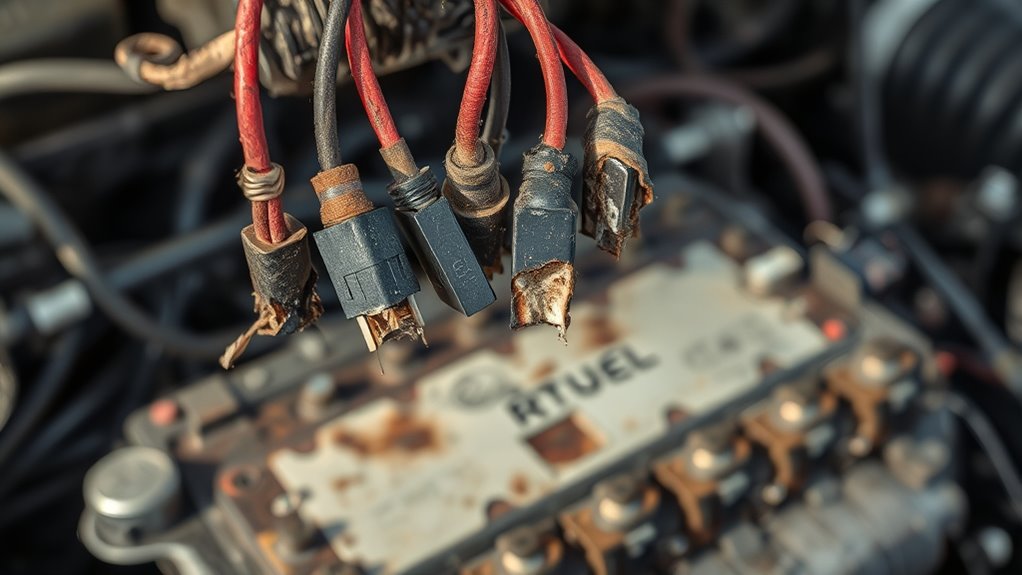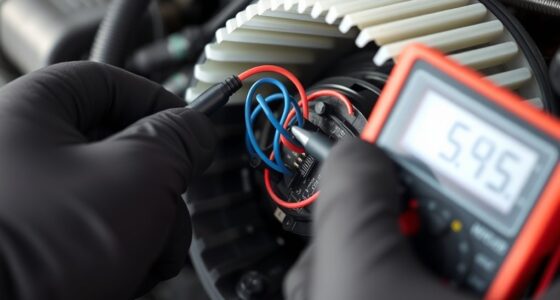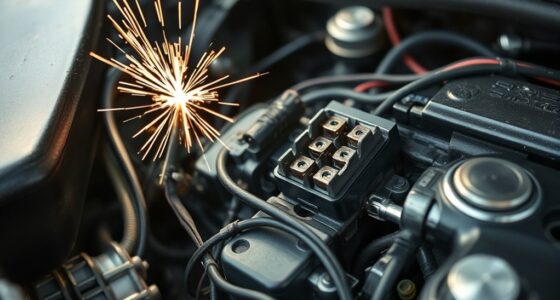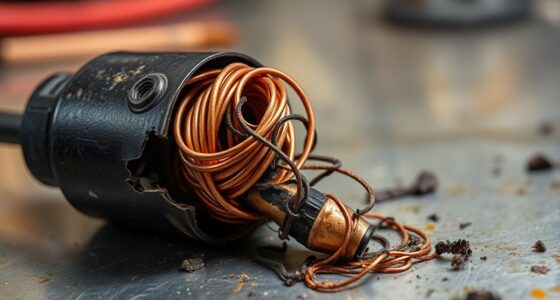If you’re experiencing ECU power and ground issues, you might notice erratic engine behavior, flickering warning lights, or sensor malfunctions. These problems often stem from corroded or damaged wiring, loose connections, or poor grounding on unpainted metal surfaces. Ensuring all wiring is intact and grounding points are secure can resolve many concerns. To get to the root of the issue and prevent future problems, it’s helpful to check your wiring harness and grounding setup carefully.
Key Takeaways
- Check for loose, corroded, or damaged ground connections to ensure a stable electrical ground for the ECU.
- Inspect wiring harnesses for corrosion, frayed wires, or damage that could disrupt power or ground signals.
- Verify that power and ground wires are properly connected and secured according to manufacturer specifications.
- Use diagnostic tools to detect voltage fluctuations or irregularities indicating grounding issues.
- Ensure ground points are attached to clean, unpainted metal surfaces for optimal electrical contact.
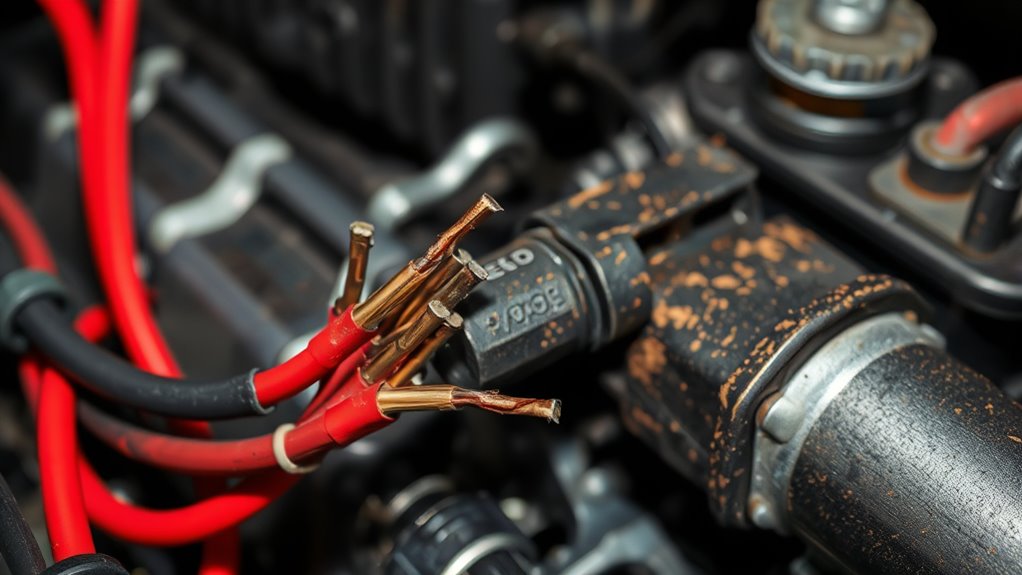
Have you ever experienced erratic engine behavior or warning lights flickering without an apparent reason? If so, you might be dealing with issues related to your ECU’s power and ground connections. These problems often stem from faulty wiring harnesses or improper sensor calibration, both of which are essential for your vehicle’s electronic control unit to function correctly. The wiring harness acts as the backbone of your vehicle’s electronic system, connecting sensors, actuators, and the ECU itself. Over time, these wires can become corroded, frayed, or loose, disrupting the flow of electrical signals. When wiring harnesses are compromised, the ECU may receive inconsistent or incorrect data, leading to unpredictable engine behavior, misfires, or warning lights flickering on your dashboard.
Faulty wiring harnesses can cause ECU errors and warning lights flickering unexpectedly.
Sensor calibration also plays a critical role in ensuring your ECU receives accurate information. Sensors monitor various engine parameters such as temperature, oxygen levels, and airflow. If these sensors aren’t properly calibrated or if their connections are compromised, the ECU can interpret faulty data. This misinterpretation can cause your vehicle to run poorly, stall, or even prevent it from starting altogether. Sometimes, sensor calibration issues are related to wiring harness problems, where damaged or loose connections prevent sensors from transmitting their signals reliably. Confirming that sensors are correctly calibrated and their wiring connections are secure can greatly improve engine performance and prevent false diagnostics.
To troubleshoot these issues, start by inspecting your wiring harness for signs of damage or corrosion. Look for loose connectors, frayed wires, or corrosion build-up that could interfere with electrical continuity. Next, verify that the sensors connected to the harness are calibrated correctly according to your vehicle manufacturer’s specifications. Many modern vehicles have diagnostic tools that can read sensor outputs and identify calibration errors. If you notice inconsistent sensor readings or suspect wiring problems, repairing or replacing the wiring harness might be necessary. Properly secured and insulated wiring ensures stable electrical flow, minimizing the risk of power or ground issues affecting your ECU. Additionally, understanding the importance of ground connections can prevent voltage fluctuations and ensure reliable ECU operation.
In some cases, the root cause lies in the grounding points of your vehicle. Check that ground wires are tightly connected to clean, unpainted metal surfaces. A poor ground connection can cause voltage fluctuations that disrupt ECU operation. Confirming proper sensor calibration, inspecting and repairing wiring harnesses, and verifying solid ground connections are essential steps to prevent or resolve ECU power and ground issues. Addressing these foundational electrical problems helps your vehicle run smoothly, keeps warning lights off, and prolongs the lifespan of your engine’s electronic components.
Frequently Asked Questions
How Can I Test My ECU Power and Ground Circuits Effectively?
To test your ECU power and ground circuits effectively, start by checking for proper voltage with a multimeter. Use circuit tracing to locate wiring issues, guaranteeing connections are secure. Perform oscillation testing by observing voltage stability when the engine runs or key switches on. This helps identify intermittent problems. Always verify the ground connection’s integrity, as poor grounding can cause erratic ECU behavior. Proper testing ensures your ECU receives clean, consistent power.
What Are Common Signs of ECU Power or Ground Failures?
Like a ship losing its anchor, your vehicle may stall or have difficulty starting if there’s an ECU power or ground failure. You might notice erratic engine behavior, poor acceleration, or a flashing check engine light. Low battery voltage or wiring corrosion can cause these issues, disrupting the ECU’s power supply. Keep an eye on these signs to catch problems early and guarantee your vehicle runs smoothly.
Can a Bad Ground Cause Engine Stalling or Misfires?
Yes, a bad ground can cause engine stalling or misfires. When the ground connection is compromised, it can lead to inconsistent battery voltage reaching the ECU, affecting fuel injection and ignition timing. Ground corrosion or loose connections disrupt the electrical flow, making your engine run poorly or stall unexpectedly. Checking and cleaning the ground connections and ensuring proper grounding can help resolve these issues and restore smooth engine performance.
Are There Specific Tools Needed to Diagnose Power Issues in the ECU?
Yes, you’ll need specific tools to diagnose power issues in the ECU. Diagnostic tools like a scan tool help read error codes and monitor system data, while electrical testers, such as a multimeter or test light, allow you to check voltage and ground connections directly. These tools help you pinpoint power supply problems quickly, ensuring you can accurately diagnose and fix issues affecting your ECU’s performance.
How Often Should I Inspect ECU Power and Ground Connections?
You should inspect your ECU power and ground connections every 6 to 12 months, like tending to a garden before weeds take over. Look for connector corrosion and check wiring integrity, ensuring nothing’s loose or frayed. Regular wiring inspections prevent small issues from snowballing into major problems, keeping your vehicle’s brain running smoothly. Think of it as giving your car’s nervous system a quick health check before it causes trouble on the road.
Conclusion
When your ECU faces power and ground issues, it’s easy to think the fix is simple. But just like a car’s performance depends on a stable electrical system, so does your confidence in your vehicle. Ignoring these small connections can lead to bigger problems, much like neglecting a tiny crack can cause a larger break. Ensuring solid power and ground connections keeps your car running smoothly, proving that the tiniest details make the biggest difference.
